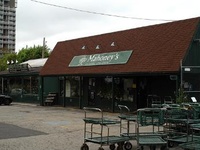“So far everything has gone very well,” she says. “We are making extensive efforts that engage them in our planning processes.”
University President Lawrence H. Summers says representatives from HLS and FAS meet frequently to set a common strategy for the North Yard.
“One of the things I’ve tried to do since I became president is establish a principle that in terms of its external interface with the community, the University speaks with a single voice, a single message,” he says.
Down By The River
While negotiations progress in Agassiz, across town in the Riverside neighborhood, a prolonged, traditional town-gown battle over how Harvard uses its land will continue at least into next fall.
Last summer, Harvard gave up a two-year-old fight to build a modern art museum along Memorial Drive in the working class neighborhood.
From the moment Harvard announced the plan to build a museum, the neighbors opposed it—and in the fall of 2000 got the city council to issue a moratorium, that prevented any building in their neighborhood.
While the moratorium was in effect, Harvard and the neighbors met for more than a year to plan new zoning for the entire area, with a specific focus on the site of the proposed museum, currently home to Mahoney’s Garden Center.
But the negotiations ended in stalemate last spring, with community activists wanting to take the site for a park—and many urging the city to seize the plot with its powers of eminent domain—and Harvard wanting to build on it.
The neighbors settled on a plan that would cut the height of buildings allowed on the site from 120 feet to 24 feet.
Over last summer, the Planning Board reviewed the neighbor’s zoning recommendations and decided they were too “punitive,” according to planning board member Hugh Russell ’64. The planning board moved to amend the neighborhood zoning, to allow Harvard to build up to 45 feet on the Mahoney’s site—and leaving room for negotiations over taller buildings.
With the controversial museum proposal scrapped, Harvard officials announced the plan to build graduate student housing on the site instead.
Last fall, a group of Riverside activists, led by Cob Carlson, took their case directly to the city council, submitting their original zoning petition for the council to consider side-by-side with the one amended by the planning board.
Now both sides await a city council decision on the two petitions, which will both expire in June. Sullivan says the council will re-file the petitions and expects they will vote on them by this fall.
Carlson says he believes four councillors are supportive of the neighborhood petition, although he declined to say which ones.
Read more in News
Pataki: 'Yale is Going to Crush Harvard'














